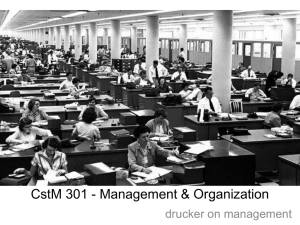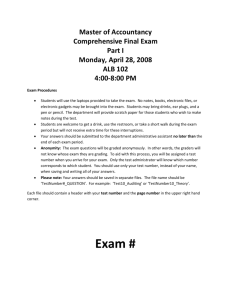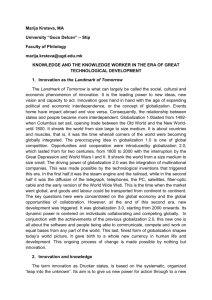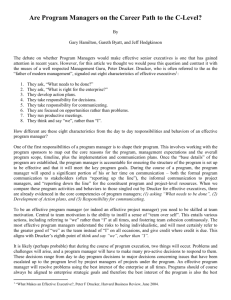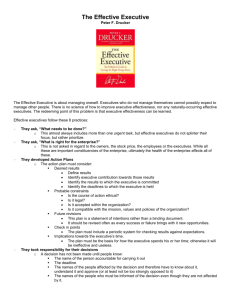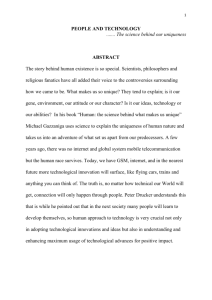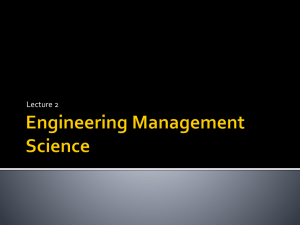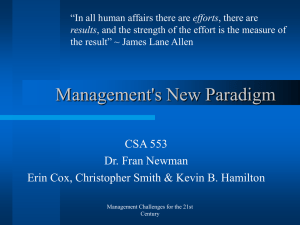essay - Global Peter Drucker Challenge
advertisement
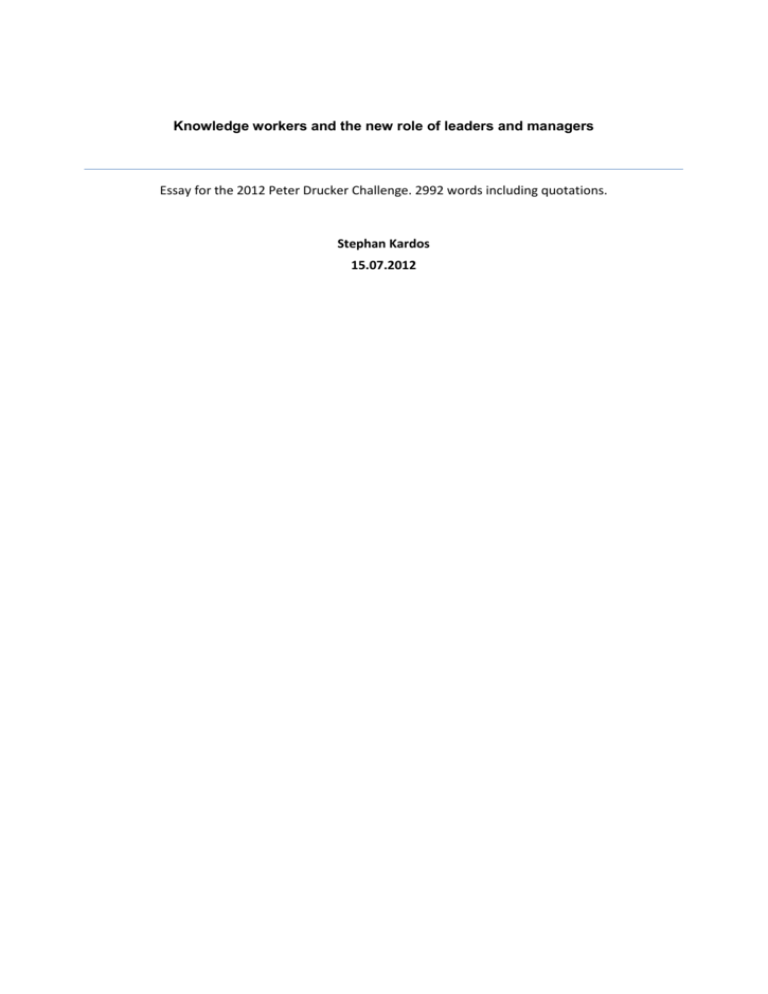
Knowledge workers and the new role of leaders and managers Essay for the 2012 Peter Drucker Challenge. 2992 words including quotations. Stephan Kardos 15.07.2012 Knowledge workers and the new role of leaders and managers Earlier this year I read an interesting article in Harvard Business Review (Molinsky, et al., 2012, pp. 139-143) where experts (all professors) agree on 3 skills every 21st-century manager needs. They conclude that “code switching between cultures”, “wielding digital influence” and “dividing attention deliberately” are the essential skills to overcome today’s challenges of global and flatter hierarchies full of technology. No doubt, working and living in our multi-cultural, tech-driven and complex world demands each of these skills. But honestly, as this article focused on managers and executives I somehow missed the link to what is considered as one of the future developments in this century: the shift from manual to knowledge work and consequently the concept of knowledge worker in the context of management and leadership. Regarding the notion of knowledge worker I asked myself, whether there was any skill or capability unmentioned in the article when it comes to leading people? Do today’s leaders and managers have to differ from the tayloristic understanding of work? If yes, how will their roles evolve? In that sense, this essay reflects a rather new discipline of organization (management) (Drucker, 1996, p. 223) and one occurrence of social interaction (leadership) in the context of knowledge work. I try to draw attention on these aspects that certainly, in one way or another, will continue to play a major role in working context. Before that reflection, I find it useful to specify what I refer to when I use the terms leadership, management and knowledge worker. Leadership & management To start off with, it is of great importance to clearly distinguish between management and leadership or managers and leaders respectively. “Management means doing the things right, leadership means doing the right things” Drucker in: (Krames, 2009, p. 125). For my essay I will follow this druckerian view bearing in mind that seldom where topics discussed more intensely. I therefore also agree with Allan Murray’s (Murray) simple, pragmatic distinction that manager’s plan, organize and coordinate whereas leaders inspire and motivate. Scientifically this dichotomy and the question how leadership could respond to a complex environment is discussed in Walenta & Kirchler (2011, pp. 470-471) pointing out that leadership takes over meaningful and transformational functions in organizations without being necessarily endowed formally with legitimating power. Traditional managers on the other hand are seen as operation persons with authority to instruct a group of people and who feel responsible for the attainability of organizational goals and task completion. For my further reflections and for clarification I will understand managers and leaders or management and leadership in the pragmatic approach by Drucker or Murray respectively or in the scientific approach by Walenta & Kirchler. Knowledge worker When it comes to knowledge worker’s concept in my essay I refer to Thomas Davenport, who describes them as follows (Davenport, 2005, p. 11f): “Knowledge workers have high degrees of expertise, education, or experience, and the primary purpose of their jobs involves the creation, distribution, or application of knowledge. Knowledge workers think for a living. They live by their wits – any heavy lifting on the job is intellectual, not physical. They solve problems, they understand and meet the needs of customers, they make decisions, and they collaborate and communicate with other people in the course of doing their own work.” What becomes clear is that by applying their knowledge in new, complex situations, knowledge workers create new knowledge while developing on the job continuously. Knowledge work is certainly not new and not merely around since Peter Drucker’s first description in Landmarks of tomorrow (1959). Just think of the first university (1088) in Bologna or clerics not to mention those people who somehow set up pyramids in the African desert without any technical comfort. So why all this buzz about knowledge work in the recent past? I think the main reason derives due to their sheer number. Peter Drucker already anticipated nearly 15 years ago, that knowledge workers, even if they will not represent the society’s majority, they certainly will represent the biggest individual group regarding population and working potential in the most developed countries (Drucker, 1996, p. 209). He argues, that knowledge workers will constitute the leading class (though not the regnant one) and represent one third of American working potential by the end of the century. With this estimation Drucker proved once more his ability of foresight and razor sharp analytical thinking. Davenport estimates that, depending on the definition of knowledge work, this “class” stands for between 25% and 50% of U.S. workforce (Davenport, 2005, p. 5). He further assesses other developed countries’ ratio (e.g. Canada or Great Britain) about same – again depending on the definition of knowledge work. For my essay, however, the definition of knowledge work plays in so far a sensitive role as I think that one should consider the intensity of knowledge work conducted, in other words the usual amount of knowledge work in a given job. “Pure” knowledge work I suppose is rather theoretical and I assume that even though we speak of knowledge workers, a certain amount of manual or routine work will still be found. Drucker even proposed a term for the blurred knowledge worker term and dubbed them “technologists”. He described them doing both knowledge work and manual work applying either knowledge of highest order (e.g. surgeons) or knowledge only being a small part of an otherwise manual task (e.g. clerks) (Drucker, 1999, p. 149f). Davenport offered different attributes along which one could classify knowledge workers such as level of interdependence and complexity of work just to name one pair (Davenport, 2005, p. 26f). I therefore, too, will bear in mind, that talking about knowledge worker does not mean pure knowledge work as it might be assumed from its nomenclature. The role of leadership and management in the knowledge society With my 28 years of age I could agree easily if someone told me that work and our overall concept of work changed in the last decades. Sure, I intentionally witnessed merely ten to fifteen years when it comes to topics such as work organization or working environment but still I think that according to my perception (e.g. books, reports, discussions, education, profession or media) our society goes through a transformation in working life. The accent however lies in the word transformation; I shall come back to that in my conclusion. Clumsily summarized my essay’s line of thought looks as follows: I think that in the past managers where essential in working life whereas leaders are needed to respond to today’s challenges especially in context with knowledge workers. I think that a great deal of work conducted by today’s managers can be carried out by individual (knowledge) workers themselves; management on the other hand has to evolve towards what I outlined above under leadership. Managers of tomorrow do need leadership quality to inspire, motivate and foster people. But wait a minute … why should we abandon something or play down its importance even Drucker called the biggest invention of the 20th century: management? (Drucker, 1974, p. 11). Well, we do not have to abandon management per se but acknowledge that management context changed in the last 100 years (Murray). The managed organization was certainly critical after the industrial revolution. But in this century we have to rethink the answers, procedures and techniques developed when we want to face complexity. I believe that people will have to manage themselves that is to take over responsibility for management. Drucker (1999, pp. 161-195) described this development in whole chapter in his classic Management challenges for the 21st century lining out the major questions. In this sense I underline Drucker’s demands on tomorrow’s workforce that has to reflect itself very carefully in order to be able to contribute. People will not look up to one person to hear about how something is done. Consequently we should start with what Drucker often proposed: asking the right questions (Krames, 2009, p. 81). Knowledge workers will know best about the how, the question remaining is the what (for), that is the purpose! Consequently, the knowledge workforce must ask the following right questions (Drucker, 1999, pp. 161-195): Where do I have my strengths? Where do I belong? What can I contribute? What is my responsibility when it comes to relationship? In the moment people are aware and reflected about these questions they can position themselves where there impact is maximized. A lot of the energy I think will derive from the mere fact, that people do what they are best in. In this sense I propose that workforce is not seen as asset or resource but encountered as partner critical to reach the shared goals. Drucker, I think, meant this when he wrote (Drucker, 1999, pp. 21-22): “One does not “manage” people. The task is to lead people. And the goal is to make productive the specific strengths and knowledge of each individual”. But what happens to the today`s manager then? Will the job centers face thousands of unemployed managers, once people take their share and responsibility in managing themselves? Again I have to put this in perspective. As briefly mentioned above, I believe that today’s manager develop to something that shows clear signs of leadership, taking over different priorities. Why not follow modern naming? Call them managers 2.0 if you like. Mather of fact, Gary Hamel used exactly this naming when he publicized an article regarding management “reinvention” in the February 2009 Harvard Business Review edition: Moon shoots for management. The concept is quite simple (Hamel, 2009) and could be summarized something like this: OK … management reached its boundaries regarding today’s complex environment and multi-faceted challenges. So why don’t we simply bring together 35 top management scholars and practitioners, ask them to debate for a couple of days about the future of management and see what happens? As a result the group proposed 25 (neither mutual exclusive nor exhaustive) points to tackle this question. Some of the points I find quite interesting and they strongly support my opinion, that managers has to become leaders if they want to tackle the issues of today’s volatile world. Exemplary I will use 3 points of Hamel’s article that I rated the most striking (Hamel, 2009): Firstly, and this was also number one in Hamel’s article, you must make sure, that management serves for higher purpose. Human energy might be mobilized best when you focus your achievements of socially significant and noble goals. I think that does not necessarily mean that each and every company will eventually spawn into merely social actors. But I do believe that the strong focus on dividends, profit or shareholder value must be relativized. I share last year’s Drucker challenge winner’s hope that management should “… be good for bringing human side of business to life again in the upcoming decades …” (Khan, 2011, p. 5). Actually, social responsibility is a point Drucker has listed as one of the three dimensions of management (Drucker, 2010, pp. 33-34). He realized that the companies are a society’s organ and therefore its only justification lies in its societal utility. I assume this is especially true in knowledge work context. Secondly, Hamel’s results propose to eliminate the pathologies of formal hierarchies. I find this point very striking as still the first thing you probably find in a company’s “about us” section is the well-known organization chart. For what I know or at least read about knowledge workers this kind of organization perception with its hierarchy, functional specialisation and rigid (communication) structure should not be applied for the knowledge worker. In fact the this tool of organization dates back more than 150 years “when Daniel McCallum became general superintendent of the New York and Erie railroad line in 1854, he developed a map of his organization and operations, a diagram that became the first organization chart in business history. This chart allowed him to run efficient and wellcoordinated railroads, leading to other businesses adopting the concept.” (Chandler Jr., 1988). Organigrams are/were supposed to make an organisation manageable depicting different departments and their boundaries, showing hierarchy and chains of command as well as the (intended) flow of communication. Whether this organization of work is contemporary and – even more important – appropriate for the future of knowledge workers I strongly doubt. Hamel (2009) therefore proposes to give status and influence to those who contribute instead of mere legitimation through position. This idea I assume would perfectly make sense in a knowledge worker context where expertise may (temporarily) legitimize. Eventually I would like to highlight somewhat like a general suggestion when Hamel (2009) asks for the redefinition of leadership work: Mobilizing others despite a lack of autonomy and creating an environment where people can innovate and perform will be traits of natural leaders (Hamel, 2009). “…leaders will no longer be seen as grand visionaries, all-wise decision makers, and ironfisted disciplinarians. Instead, they will need to become social architects, constitution writers, and entrepreneurs of meaning” (Hamel, 2009). I suppose this was understood by Drucker (2010, p. 339) when he concluded that additionally to intellectuals with their specific knowledge it will take managers to foster this knowledge in the service of organizations. Without managers intellectuals shall do as they please whereas without intellectuals management degenerates to bureaucracy. He further urges that even though we will not need generalists, it will be crucial that we understand the different fields of knowledge (Drucker, 2010, p. 341). I notice that social architecture and entrepreneurship of meaning – as described by Hamel - gain new momentum when viewed with “druckerian glasses”. In this context I also strongly support what Seliger and Tolchinsky (2010) propose as new paradigm for leadership. They describe practical leadership using 3 perspectives (Seliger & Tolchinsky, 2010, pp. 75-76): Leading oneself means that in a complex and turbulent environment leaders have to be highly self-reflecting as they have to think over on their new roles as enablers or supporters for the whole. This perspective fits very well to Hamel’s (2009) redefinition of work. Leading people includes the awareness that people – as humans – are living systems and therefore come with own needs and desires that has to be addressed by organizational environment under the light of corporation goals and tasks. Motivating people in this context means to ensure that this two set of goals are linked so that performance is assured. Here again I see a clear connection to the higher purpose of management described above as so far the needs of knowledge workers cannot be neglected any longer. This needs I claim might include social needs as well that ideally could be addressed by the organization. Leading people also means to give them orientation to the questions that should characterize their work. Communication is key to do so. Here I would like to draw the attention of the major factor that Drucker thought regarding knowledge worker productivity. He claimed that defining “What is the task?” is the major question that the knowledge worker has to find out in order to concentrate on the task and to drop anything else (Drucker, 1999, pp. 142-145) Leading an organization finally demands organizations, in order to deal with complexity, to be successful regarding market, society and nature by making decisions and communicating those. Decisions are required “… about goals, resources, relationships, conflicts, strategies, processes, structures as well as decisions themselves by asking: how are decisions made?” (Seliger & Tolchinsky, 2010, p. 76). Here I see connections to removing the pathologies of hierarchy as decisions certainly will be needed in future, too. Perhaps the well-known topdown might be reconsidered. I propose giving knowledge a greater voice. Conclusion A great number of questions arise with the concept of knowledge worker. The theme and context description of this year’s Global Drucker Challenge gives us a good but still not exhaustive overview of possible points of contact regarding the topic. One of the essential points however might be management and leadership in the context of knowledge work. I propose that the roles of managers and leaders have to evolve in order to tackle complexity challenges of today’s working environment and adapting to the nature of knowledge work. In this sense the three essential skills needed by managers in the 21st century as stated in the mentioned Harvard Business Review article has to be completed, at least from my point of view, by knowledge workers role development including managerial issues and managers evolvement towards transformational leadership. Apropos transformation. I also mentioned that I consider working life under transformation towards knowledge based society. What makes this social change difficult is best described in Drucker’s’ Management challenges for the 21st century (1999, pp. 3-5): Drucker claims that paradigms, i.e. the prevailing general theory, consist of a basic set of assumptions about reality. This set of basic assumptions strongly influences what the discipline (in this context management) will focus on, what is considered as true and what not. In a social discipline (as opposed to natural science) practitioners (here: managers) will consequently behave as they are told by the disciplines basic assumptions. I assume that change regarding the organization of work lacks for the described reason: the change process first must alter the assumptions (here regarding management and leadership in knowledge work context) which take a certain period of time before it can influence the focus and behaviour of scholars and practitioners - and consequently society. There are, however, a few promising leadership concepts summarized and described in Avolio, Walumbwa and Weber (2009, p. 422) who stress out, that today leadership must take into account other factors than solely the leader. Applying this concepts and therefore adapting to the changed working environment might prove as the critical part. Having said this, challenges in the manner of “Global Peter Drucker Challenges”, where people come together to think of tomorrow’s challenges and come up with critical thoughts and inspiring ideas, may accelerate the needed transformation. Sources Avolio, B. J., Walumbwa, F. O. & Weber, T. J., 2009. Leadership: Current theories, research and future directions. Annual Review of Psychology, pp. 421-449. Chandler Jr., A. D., 1988. Origins of the organization chart. Harvard Business Review, March, 66(2), pp. 156-157. Davenport, T. H., 2005. Thinking for a living: how to get better performance and results from knowledge workers. s.l.:Harvard Business Press. Drucker, P. F., 1974. Management: Tasks, Responsibilities, Practices. Oxford: ButterworthHeinemann. Drucker, P. F., 1996. Umbruch im Management: Was kommt nach dem Reengineering?. Düsseldorf: ECON. Drucker, P. F., 1999. Management Challenges for the 21st Centuary. New York: HarperBusiness. Drucker, P. F., 2010. Was ist Management? Das beste aus 50 Jahren. Berlin: Ullstein Buchverlage GmbH. Hamel, G., 2009. Moon shoots for management. Harvard Business Review, February. Khan, W., 2011. Humanizing the Law of Business Corporations for Good Management Practices. [Online] Available at: http://ssrn.com/abstract=1992636 Krames, J. A., 2009. Peter F. Druckers kleines Weißbuch. München: Finanzbuch Verlag GmbH. Molinsky, A. L., Davenport, T. H., Iyer, B. & Davidson, C., 2012. 3 skills every 21st-century manager needs. Harvard Busniess Review, January-February, pp. 139-143. Murray, A., n.d. Online Wallstreet Journal. [Online] Available at: http://online.wsj.com/article/SB10001424052748704476104575439723695579664.html [Accessed 15 July 2012]. Murray, A., n.d. Online Wallstreet Journal. [Online] Available at: http://guides.wsj.com/management/developing-a-leadership-style/what-is-thedifference-between-management-and-leadership/ [Accessed 15 July 2012]. Seliger, R. & Tolchinsky, P. D., 2010. Positive Leadership - The new paradigm for leadership. In: S. Schloemer & N. Tomascheck, eds. Leading in Complexity. New Ways of Management. Heidelberg: Carl-Auer Verlag GmbH, pp. 73-93. Walenta, C. & Kirchler, E., 2011. Führung. In: Arbeits- und Organisationspsychologie. Wien: Facultas Verlags- und Buchhandels AG, pp. 413-508.
